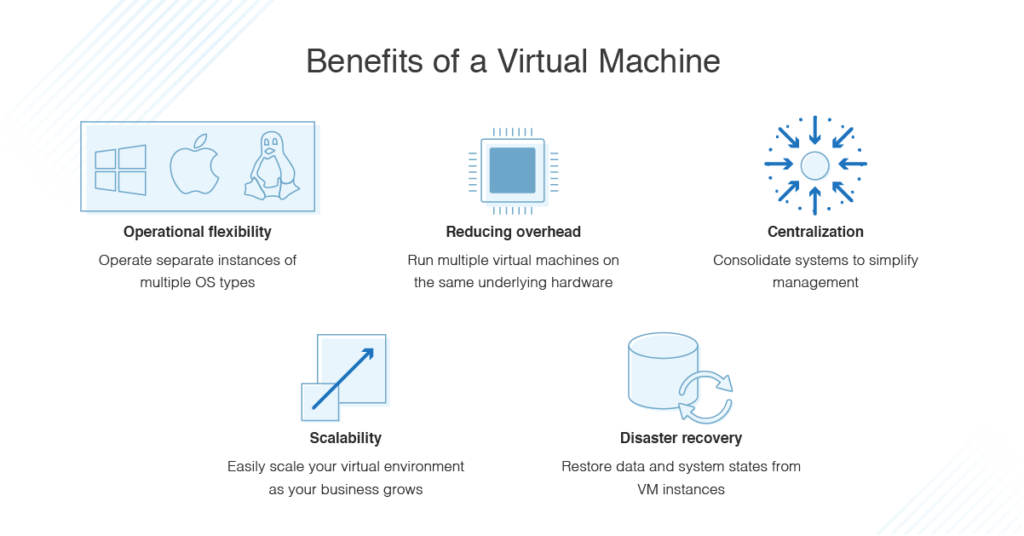In today’s rapidly evolving technological landscape, virtual machines (VMs) have emerged as a game-changer, transforming the way we approach computing. By simulating the capabilities of a physical computer within a software environment, virtual machines have revolutionized resource allocation, software testing, security, and much more. In this article, we will delve into the world of virtual machines, exploring their benefits, applications, and the impact they have on various industries.
Understanding Virtual Machines
A virtual machine, at its core, is an emulation of a physical computer system, capable of executing software applications in an isolated and secure environment. Through virtualization technology, a single physical machine can host multiple virtual machines, each running its own operating system and applications.

The magic behind virtual machines lies in their ability to decouple software from the underlying hardware, allowing for efficient resource utilization and flexibility. This means that even with a single physical server, you can run multiple virtual machines, each tailored to specific requirements.
Benefits of Virtual Machines
- Hardware Consolidation: Virtual machines enable hardware consolidation, reducing the need for multiple physical servers. By utilizing virtualization, organizations can achieve significant cost savings in terms of infrastructure, maintenance, and energy consumption.
- Improved Resource Utilization: Virtual machines allow for dynamic allocation of computing resources, ensuring optimal utilization of available hardware. This flexibility enables organizations to scale up or down their computing needs based on demand, maximizing efficiency.
- Simplified Software Testing and Deployment: Virtual machines provide a sandboxed environment for software testing, allowing developers to simulate different operating systems, configurations, and network setups. This eliminates the need for multiple physical devices, reduces testing time, and enhances overall software quality.
- Enhanced Security and Isolation: With virtual machines, each instance operates in its own isolated environment, preventing applications from interfering with each other. This isolation improves security by containing potential threats within a virtual machine, reducing the risk of breaches or system compromises.
- Disaster Recovery and High Availability: Virtual machines simplify disaster recovery plans by allowing for easy backups, snapshots, and replication. In the event of hardware failures or system crashes, virtual machines can be quickly restored or migrated to alternate hosts, minimizing downtime and ensuring high availability.

Applications of Virtual Machines
- Server Virtualization: One of the most common use cases of virtual machines is server virtualization. By hosting multiple virtual machines on a single physical server, organizations can optimize hardware resources, streamline maintenance, and reduce infrastructure costs.
- Software Development and Testing: Virtual machines offer developers a robust platform for software development, testing, and debugging. Developers can create virtual machines with specific configurations, isolate dependencies, and replicate production environments, leading to faster development cycles and improved software quality.
- Cloud Computing: Virtual machines are the backbone of cloud computing infrastructure. Cloud service providers leverage virtualization to offer scalable, on-demand computing resources to customers, allowing them to deploy applications without worrying about hardware provisioning or management.
- Legacy System Migration: Virtual machines enable the migration of legacy systems onto modern hardware and software environments. By encapsulating the legacy system within a virtual machine, organizations can extend the lifespan of critical applications, reduce maintenance costs, and achieve greater compatibility.
- Training and Education: Virtual machines provide a safe and controlled environment for training and education purposes. They allow users to experiment, learn new technologies, and develop practical skills without the fear of causing irreversible damage to the underlying infrastructure.
Conclusion
Virtual machines have ushered in a new era of computing, redefining the boundaries of what is possible. With their ability to consolidate hardware resources, streamline software development, enhance security, and enable efficient cloud computing, virtual machines have become an indispensable tool in various industries. As technology continues to advance, virtual machines will undoubtedly play a crucial role in shaping the future of computing, unlocking new possibilities and driving innovation forward.





